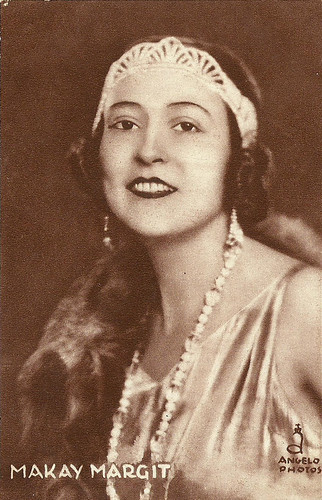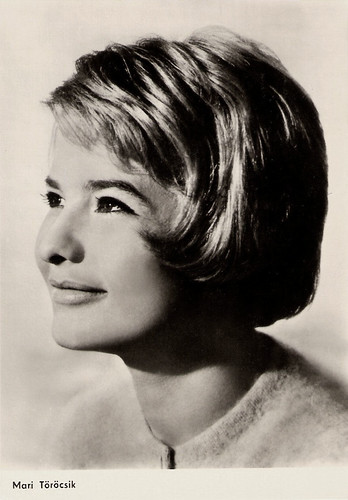Hungarian Margit Makay (1891–1989) appeared in 30 films between 1912 and 1989. She made her finest films at the end of her career with such directors as Zoltán Fábri and Károly Makk.

Hungarian postcard by Globus, Budapest. Photo: Angelo Photos. Collection: Didier Hanson.
Margit Makay was born in Miskolc, Austria-Hungary (now Hungary), in 1891. She studied at the Színészakadémián (Actor’s Academy) and graduated in 1909. She made her stage debut in 1910 in 'Az ördög/The Devil' by Ferenc Mólnar.
Through the years, she would become one of the main stage actresses of Hungary and worked for years with the Vígszínházban (Comedy Theatre) and later the Nemzeti (National Theatre).
Her film debut was the silent short Keserü szerelem/Bitter Love (Sándor Góth, 1912). She worked with director Alexander Korda at Az aranyember/Man of Gold (Alexander Korda), 1919. The following year, she played the leading role in Júdás fiai/The Sons of Judas (Ödön Uher ifj., 1920).
Then there was an interval of more than 15 years in her film career. In the sound era, she returned to the cinema in the crime film Öt óra 40/The Five-Forty (André De Toth, 1939).
During the war period she played in such films as the adventure Bercsenyi huszárok/Bercsényi Hussars (Sándor Szlatinay, 1940), Havasi napsütés/Sunshine with Snow (Ákos Ráthonyi, 1941) and Egér a palotában/Mouse in the Palace (Emil Martonffi, 1943).

Mari Töröcsik. East-German postcard by VEB Progress Film-Vertrieb, Berlin, no. 2945, 1967. Retail price: 0,20 MDN. Photo: Progress.
After the war, Margit Makay returned in smaller roles in such films as the war drama Egy asszony elindul/A Woman Starts (Imre Jeney, 1949), the drama Úri muri/Uri Spree (Frigyes Bán, 1950) and Erkel/Puszta Sounds (Márton Keleti, 1952), a biographical film about composer Franz Liszt (Iván Darvas).
In 1959, she appeared with the Hungarian stars Miklós Gábor, Éva Ruttkai and Mari Töröcsik in Kard és kocka/Sword and Cubes (Imre Fehér, 1959). She again appeared with Töröcsik in the crime drama Két vallomás/Two Confessions (Márton Keleti, 1962). Another interesting film was the historical drama A köszívü ember fiai/The Sons of the Köszívü Men (Zoltán Várkonyi, 1965) about the fight of the Hungarians for their independence from the Habsburg Empire during the mid-19th Century. The film was based on a story written by Mor Jokai.
In 1971, she had a supporting part in Hangyaboly/Ant-Hill (Zoltán Fábri, 1971) starring Mari Töröcsik as a lesbian nun in a convent. It was one of the first films that depicted lesbianism in a sensitive and understanding way.
Two years later she played one of the leading roles in Tüzoltó utca 25./25 Fireman’s Street (István Szabó, 1973). She continued to appear in such notable films as the Oscar nominated Macskajáték/Cat’s Play (Károly Makk, 1974), 141 perc a befejezetlen mondatból/141 Minutes from the Unfinished Sentence (Zoltán Fábri, 1975) and Egy erkölcsös éjszaka/A Very Moral Night (Károly Makk, 1977), in which she had the leading role.
Set in late 19th-century Budapest, the film is centred in a small-town, high-class brothel. Her final film role was as the great-grandmother in the fantasy Bye Bye Chaperon Rouge/Bye Bye, Red Riding Hood (Márta Mészáros, 1989). That same year, Margit Makay died in Budapest, Hungary. She was 98. She was married to Dr. Miksa Márton.
Sources: AllMovie, Wikipedia (English and Hungarian), and IMDb.
This post was last updated on 22 April 2025.

Hungarian postcard by Globus, Budapest. Photo: Angelo Photos. Collection: Didier Hanson.
Sunshine with snow
Margit Makay was born in Miskolc, Austria-Hungary (now Hungary), in 1891. She studied at the Színészakadémián (Actor’s Academy) and graduated in 1909. She made her stage debut in 1910 in 'Az ördög/The Devil' by Ferenc Mólnar.
Through the years, she would become one of the main stage actresses of Hungary and worked for years with the Vígszínházban (Comedy Theatre) and later the Nemzeti (National Theatre).
Her film debut was the silent short Keserü szerelem/Bitter Love (Sándor Góth, 1912). She worked with director Alexander Korda at Az aranyember/Man of Gold (Alexander Korda), 1919. The following year, she played the leading role in Júdás fiai/The Sons of Judas (Ödön Uher ifj., 1920).
Then there was an interval of more than 15 years in her film career. In the sound era, she returned to the cinema in the crime film Öt óra 40/The Five-Forty (André De Toth, 1939).
During the war period she played in such films as the adventure Bercsenyi huszárok/Bercsényi Hussars (Sándor Szlatinay, 1940), Havasi napsütés/Sunshine with Snow (Ákos Ráthonyi, 1941) and Egér a palotában/Mouse in the Palace (Emil Martonffi, 1943).

Mari Töröcsik. East-German postcard by VEB Progress Film-Vertrieb, Berlin, no. 2945, 1967. Retail price: 0,20 MDN. Photo: Progress.
Fight for independence
After the war, Margit Makay returned in smaller roles in such films as the war drama Egy asszony elindul/A Woman Starts (Imre Jeney, 1949), the drama Úri muri/Uri Spree (Frigyes Bán, 1950) and Erkel/Puszta Sounds (Márton Keleti, 1952), a biographical film about composer Franz Liszt (Iván Darvas).
In 1959, she appeared with the Hungarian stars Miklós Gábor, Éva Ruttkai and Mari Töröcsik in Kard és kocka/Sword and Cubes (Imre Fehér, 1959). She again appeared with Töröcsik in the crime drama Két vallomás/Two Confessions (Márton Keleti, 1962). Another interesting film was the historical drama A köszívü ember fiai/The Sons of the Köszívü Men (Zoltán Várkonyi, 1965) about the fight of the Hungarians for their independence from the Habsburg Empire during the mid-19th Century. The film was based on a story written by Mor Jokai.
In 1971, she had a supporting part in Hangyaboly/Ant-Hill (Zoltán Fábri, 1971) starring Mari Töröcsik as a lesbian nun in a convent. It was one of the first films that depicted lesbianism in a sensitive and understanding way.
Two years later she played one of the leading roles in Tüzoltó utca 25./25 Fireman’s Street (István Szabó, 1973). She continued to appear in such notable films as the Oscar nominated Macskajáték/Cat’s Play (Károly Makk, 1974), 141 perc a befejezetlen mondatból/141 Minutes from the Unfinished Sentence (Zoltán Fábri, 1975) and Egy erkölcsös éjszaka/A Very Moral Night (Károly Makk, 1977), in which she had the leading role.
Set in late 19th-century Budapest, the film is centred in a small-town, high-class brothel. Her final film role was as the great-grandmother in the fantasy Bye Bye Chaperon Rouge/Bye Bye, Red Riding Hood (Márta Mészáros, 1989). That same year, Margit Makay died in Budapest, Hungary. She was 98. She was married to Dr. Miksa Márton.
Sources: AllMovie, Wikipedia (English and Hungarian), and IMDb.
This post was last updated on 22 April 2025.
2 comments:
Hello, Bob! I'd missed hearing from you on PFF! I'm glad to have found you again. Your blog is wonderful--the research you do is just incredible. Have a lovely week!
Hello, Bob--don't let your schedule take you out of PFF. I leave the linky open for six days, so you can join us any time between Friday and the following Thursday.
I'd love to see you back again. I truly enjoy your posts--and I know there are others who will, too.
Take care and have a great week!
Post a Comment